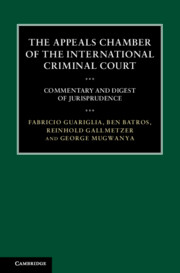Book contents
- The Appeals Chamber of the International Criminal Court
- The Appeals Chamber of the International Criminal Court
- Copyright page
- Dedication
- Contents
- Contributors
- Foreword
- Foreword
- Preface
- Acknowledgements
- Disclaimer
- Abbreviations
- Table of Cases
- A Interpretation and Structural Issues
- B Jurisdiction and Admissibility
- C Cooperation and Judicial Assistance
- D Arrest and Detention
- E Charges and Confirmation Hearing
- F Disclosure and Redactions
- G The Protection of Victims and Witnesses
- H Fairness, Expeditiousness of the Proceedings, and Rights of the Accused
- I Offences against the Administration of Justice and Misconduct before the Court
- J Conduct of Trials
- K Sentencing
- L Reparations
- M Victim Participation in the Proceedings
- N Substantive Law
- O Conduct of Appeals
- P Miscellaneous Procedural Issues
- Q Index of Digested Decisions
- General Index
F - Disclosure and Redactions
Published online by Cambridge University Press: 19 October 2018
- The Appeals Chamber of the International Criminal Court
- The Appeals Chamber of the International Criminal Court
- Copyright page
- Dedication
- Contents
- Contributors
- Foreword
- Foreword
- Preface
- Acknowledgements
- Disclaimer
- Abbreviations
- Table of Cases
- A Interpretation and Structural Issues
- B Jurisdiction and Admissibility
- C Cooperation and Judicial Assistance
- D Arrest and Detention
- E Charges and Confirmation Hearing
- F Disclosure and Redactions
- G The Protection of Victims and Witnesses
- H Fairness, Expeditiousness of the Proceedings, and Rights of the Accused
- I Offences against the Administration of Justice and Misconduct before the Court
- J Conduct of Trials
- K Sentencing
- L Reparations
- M Victim Participation in the Proceedings
- N Substantive Law
- O Conduct of Appeals
- P Miscellaneous Procedural Issues
- Q Index of Digested Decisions
- General Index
Summary
- Type
- Chapter
- Information
- The Appeals Chamber of the International Criminal CourtCommentary and Digest of Jurisprudence, pp. 205 - 242Publisher: Cambridge University PressPrint publication year: 2018



